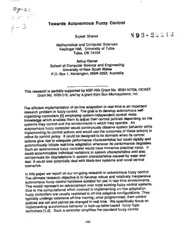
NASA Technical Reports Server (NTRS) 19930013024: Towards autonomous fuzzy control PDF
Preview NASA Technical Reports Server (NTRS) 19930013024: Towards autonomous fuzzy control
Towards Autonomous Fuzzy Control Sujeet Shenoi Mathematical and Computer Sciences Keplinger Hall, University of Tulsa Tulsa, OK 74104 Arthur Ramer School of Computer Science and Engineering University of New South Wales P.O. Box 1, Kensington, NSW 2033, Australia This research is partially supported by NSF-RIA Grant No. IRI9110709, OCAST Grant No. AR9-010, and by a grant from Sun Microsystems, Inc. The efficient implementation of on-line adaptation in real time is an important research problem in fuzzy control. The goal is to develop autonomous self- organizing controllers [5] employing system-independent control meta- knowledge which enables them to adjust their control policies depending on the systems they control and the environments in which they operate. An autonomous fuzzy controller would continuously observe system behavior while implementing its control actions and would use the outcomes of these actions to refine its control policy. Itcould be designed to lie dormant when its control actions give rise to adequate performance characteristics but could rapidly and autonomously initiate real-time adaptation whenever its performance degrades. Such an autonomous fuzzy controller would have immense practical value. It could accommodate individual variations in system characteristics and also compensate for degradations in system characteristics caused by wear and tear. It could also potentially deal with black-box systems and novel control scenarios. In this paper we report on our on-going research in autonomous fuzzy control. The ultimate research objective is to develop robust and relatively inexpensive autonomous fuzzy control hardware suitable for use in real time environments. This would represent an advancement over most existing fuzzy control systems. Due to the computational effort involved in implementing on-line adaptation fuzzy controllers are usually restricted to off-line adaptive configurations. They typically undergo extensive off-line training; once programmed, their control policies are set and cannot be changed in real time. We specifically focus on implementing autonomous behavior in look-up-table-based fuzzy logic controllers [1,6]. Such a controller simplifies the standard fuzzy control 282 algorithm by employing a look-up table generated off-line from an initial set of common sense fuzzy rules. The table acts as the control surface and represents "compiled" control knowledge. The look-up table for a two-term controller is a discrete function mapping error and error-change inputs to corresponding controller outputs; it gives rise to a 3-dimensional control surface. The main challenge when implementing on-line adaptation in look-up table controllers is to effectively deal with the computational effort involved in recomputing the look-up table after each change to a membership function or fuzzy rule [2]. Adaptation typically corresponds to producing new "object-code" (look-up table) by repeatedly recompiUng "source-code" (rules and membership functions). However, our approach bypasses the recompilation step required during controller adaptation by appropriately modifying the look- up table itself. Adaptation thus involves "hammering" the control surface itself. Controlled changes to the control surface have the overall effect of fine-tuning the control policy by quantitatively strengthening or weakening certain rules. Simulation experiments indicate that this approach is highly effective and robust. Moreover, it is possible to ensure that the qualitative characteristics of the original common-sense rules are retained during controller adaptation [2,3]. In this paper we describe our efforts at implementing autonomy in look-up-table- based fuzzy controllers. We start with a basic on-line adaptive algorithm combining gain coefficient tuning with direct look-up table modification [2,3]. We show how this algorithm can be further refined using control meta- knowledge to systematically guide and accelerate controller adaptation [4]. Finally, we describe our attempts at endowing the controller with common- sense knowledge which allows it to monitor its own performance and to autonomously trigger its own adaptation. The control algorithm for implementing autonomy in look-up table controllers is fast and relatively robust, but is still simple enough for hardware implementation. Simulation experiments indicate that itcan effectively deal with a variety of systems. Moreover, its control meta-knowiedge is powerful enough to effect rapid performance improvements even when the initial control policies are derived from incorrect lq,,_esor vacuous rule bases. References [1] M. Braae and D. A. Rutherford, Theoretical and linguistic aspects of the fuzzy logic controller, Automatica, vol. 15, 553-557, 1979. [2] 0. MaJlampati and S. Shenoi, Self-organizing fuzzy logic control, in Knowledge Based Systems and Neural Networks: Techniques and Applications, R. Sharda, J. Y. Cheung, and W. J. Cochran (Eds.), Elsevier Science, New York, N.Y, pp. 271-282, 1991. 283 [3] D. Mallampati and S. Shenoi, Adaptive fuzzy logic controllers, Proceedings of the Fourth International Conference on Industrial and Engineering Applications of Artificial Intelligence and Expert Systems, Kaual, Hawaii, pp. 62-71, 1991. [4] D. Mallampati and S. Shenoi, On-line adaptive fuzzy logic controllers, Proceedings of the 1992 International Fuzzy Systems and Intelligent Control Conference, Louisville, Kentucky, pp. 68-80, 1992. [5] T. J. Procyk and E. H. Mamdani, A self-organizing fuzzy logic controller, Automatica, vol. 15, 15-30, 1979. [6] D. A. Rutherford and J. C. BIoore, The implementation of fuzzy algorithms for control, Proceedings of the IEEE, vol. 64, 572-573, 1976. 284
